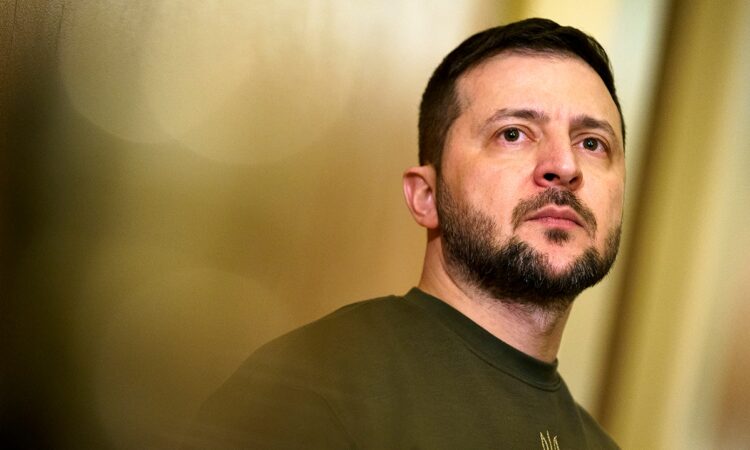
Ukraine’s victories on the battlefield have earned Ukraine the right to a peaceful and prosperous future in Europe. To become a full member of the West, Ukraine will require a strong security agreement and a credible and timely European Union (EU) accession process. The promise of EU membership is such a powerful and an attractive “carrot” for many countries that they are willing to make tough political decisions and implement burdensome reforms to join the European family. EU accession needs to be the North Star of Ukraine’s reconstruction and modernization, which includes an announced timeline of ten years or less for accession, with real negotiations starting this year.
The EU granted Ukraine “candidate status” in June 2022 but has not officially begun what is called EU “negotiations,” which are the main vehicle for making hard reform “asks” of Ukraine. The foreign aid that Ukraine needs from the EU, the U.S. and others should be linked to the asks of EU accession. This is one of the major conclusions from the Center for Strategic and International Studies (CSIS) Commission on Ukraine’s Economic Reconstruction.
A series of 2023 high-level EU meetings could move this accession in the right direction. Next month’s EU and Ukraine summit could announce the beginning of negotiations; however, there are several hold-ups to moving this agenda forward.
First, the EU has “constitutional issues.” Some states want to change the rules about unanimity so that one member country cannot hold up big decision as is the case now. With Sweden and Spain holding the EU presidency, these two countries should lead the process to resolve this issue.
Second, some countries do not want Ukraine to enter the EU. They (quietly) argue that Ukraine is too big and “does not share our values right now” (code for “too religious, perhaps too conservative and too many cheap laborers who might flood the EU”). These same arguments were made against Spain and Poland when they wanted to join the EU; however, both of those countries have since become wealthy, now share economic and other burdens with the EU member states and are major contributors to the Union. Today, Germany is one of the countries that is dragging its feet on Ukraine joining the EU.
Third, there are concerns about Ukraine “jumping the line” over countries — like Serbia in the Balkans and even Turkey — which have waited a long time for EU membership. Given the war and the sacrifices the country has made, Ukraine deserves to jump the line.
Spain, which holds the EU presidency in the second half of 2023, has a special responsibility given that it was in a similar position as Ukraine when it joined in 1986 after nine years. Some countries, like the United Kingdom, did not want Spain to join (an irony since the UK later left the EU via “Brexit”) while Germany served as Spain’s main sponsor. Following Germany’s example, Spain (and perhaps Poland) should commit to being Ukraine’s main EU sponsor, actively supporting and advocating for Ukraine’s accession process for the next 10 years.
This process will not be easy: EU accession will require Ukraine to make very arduous reforms. Ukraine will have to, among other things: improve its rule of law, strengthen property rights, reduce corruption, fix its judicial system, and creating a credible commercial dispute resolution system. Ukraine will have to privatize or close some of its 3,300 state-owned enterprises. There are reforms in the energy, banking, and agricultural sector that will go against vested interests, including powerful oligarchs; however, since 2014, Ukraine has shown it can implement difficult reforms — and has made progress on all seven of the reform areas that the EU gave Ukraine.
At the end of that process, Ukraine will access tens of billions of dollars in infrastructure funding to rebuild and modernize its railway, airports, and roads so that it can deepen its ties with the West. With the closing of the Black Sea ports, Ukraine needs several infrastructure “Plan Bs” including new roads, port access via the Danube and improved rail links to Poland or Romania. With its economy based on “hands (manufacturing), brains (tech), and grains (agriculture),” the right energy mix, and a free market-friendly set of economic policies, Ukraine should become the breadbasket of Europe, a European Silicon Valley and a major manufacturing hub.
Ukraine’s reconstruction will be contingent on security guarantees from the West. Over time, Ukraine should be invited to join NATO. In the meantime, Ukraine as a geo-strategic partner needs an arrangement like the one we have with Israel. The U.S. has no treaty obligations to Israel, but it grants substantive ten-year packages of military and economic assistance and allows Israel to buy “top shelf” weapons.
A safe and prosperous Ukraine benefits the EU and the whole democratic world. If given the chance, Ukraine will follow the same path as Spain or Poland. Within a generation of EU membership, Ukraine will be a prosperous member of the EU and a card-carrying member of the Western alliance.
Daniel F. Runde is a senior vice president and director of the Ukraine economic reconstruction commission at the center for strategic and international studies. He is the author of “The American Imperative: Reclaiming Global Leadership Through Soft Power” to be published in February by Bombardier Books.





